
Giovanni Boccaccio was an Italian writer, poet, correspondent of Petrarch, and an important Renaissance humanist. Born in the town of Certaldo, he became so well known as a writer that he was sometimes simply known as "the Certaldese" and one of the most important figures in the European literary panorama of the fourteenth century. Some scholars define him as the greatest European prose writer of his time, a versatile writer who amalgamated different literary trends and genres, making them converge in original works, thanks to a creative activity exercised under the banner of experimentalism.

The Name of the Rose is the 1980 debut novel by Italian author Umberto Eco. It is a historical murder mystery set in an Italian monastery in the year 1327, and an intellectual mystery combining semiotics in fiction, biblical analysis, medieval studies, and literary theory. It was translated into English by William Weaver in 1983.

John Lydgate of Bury was an English monk and poet, born in Lidgate, near Haverhill, Suffolk, England.

Richard de Bury, also known as Richard Aungerville or Aungervyle, was an English priest, teacher, bishop, writer, and bibliophile. He was a patron of learning and one of the first English collectors of books. He is chiefly remembered for his Philobiblon, written to inculcate in the clergy the pursuit of learning and the love of books. The Philobiblon is considered one of the earliest books to discuss librarianship in-depth.
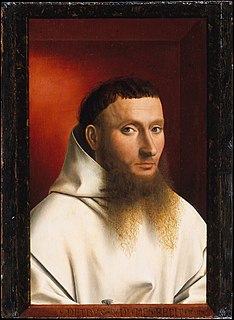
A monk is a person who practices religious asceticism by monastic living, either alone or with any number of other monks. A monk may be a person who decides to dedicate their life to serving other people and serving God, or to be an ascetic who voluntarily chooses to leave mainstream society and live their life in prayer and contemplation. The concept is ancient and can be seen in many religions and in philosophy.
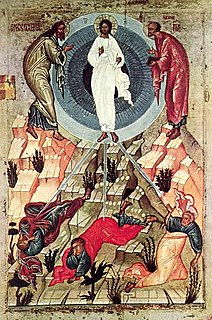
Christian monasticism is the devotional practice of Christians who live ascetic and typically cloistered lives that are dedicated to Christian worship. It began to develop early in the history of the Christian Church, modeled upon scriptural examples and ideals, including those in the Old Testament, but not mandated as an institution in the scriptures. It has come to be regulated by religious rules and, in modern times, the Canon law of the respective Christian denominations that have forms of monastic living. Those living the monastic life are known by the generic terms monks (men) and nuns (women). The word monk originated from the Greek μοναχός, itself from μόνος meaning 'alone'.
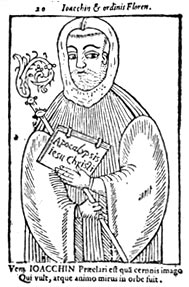
Joachim of Fiore, also known as Joachim of Flora and in Italian Gioacchino da Fiore, was an Italian Christian theologian, Catholic abbot, and the founder of the monastic order of San Giovanni in Fiore. According to theologian Bernard McGinn, "Joachim of Fiore is the most important apocalyptic thinker of the whole medieval period."
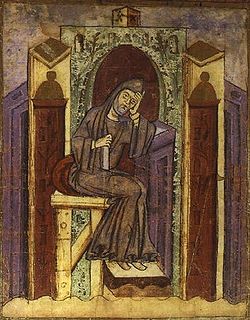
Notker the Stammerer, also known as Notker Balbulus, or simply Notker, was a Benedictine monk at the Abbey of Saint Gall, now in Switzerland, where he was a leading literary scholar of the Early Middle Ages. He was active as a poet, scholar and possibly composer, as he is usually credited with an important collection of early sequences in Liber hymnorum. Notker wrote Vita Sancti Galli and is commonly accepted to be the "Monk of Saint Gall" who wrote Gesta Karoli. He was contemporary with the fellow monks Tuotilo and Ratpert.

Benedict of Poland was a Polish Franciscan friar, traveler, explorer, and interpreter.

Sigebert of Gembloux was a medieval author, known mainly as a pro-Imperial historian of a universal chronicle, opposed to the expansive papacy of Gregory VII and Pascal II. Early in his life he became a monk in the Benedictine abbey of Gembloux.

Albert of Stade was a German monk, historian and poet.

The Ross Errilly Friary is a medieval Franciscan friary located about a mile to the northwest of Headford, County Galway, Ireland. It is a National Monument of Ireland and among the best-preserved medieval monastic sites in the country. Though usually referred to by locals as "Ross Abbey," this is not technically correct as the community never had an abbot.
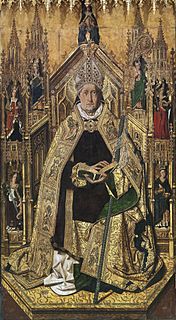
Dominic of Silos, O.S.B., was a Spanish monk, to whom the Abbey of Santo Domingo de Silos, where he served as the abbot, is dedicated. He is revered as a saint in the Catholic Church. His feast day is 20 December.
Angelo Carletti di Chivasso was a noted moral theologian of the Order of Friars Minor; born at Chivasso in Piedmont, in 1411; and died at Coni, in Piedmont, in 1495.

San Marco is a religious complex in Florence, Italy. It comprises a church and a convent. The convent, which is now the Museo Nazionale di San Marco, has three claims to fame. During the 15th century it was home to two famous Dominicans, the painter Fra Angelico and the preacher Girolamo Savonarola. Also housed at the convent is a famous collection of manuscripts in a library built by Michelozzo. Furthermore, the church houses the tomb of Pico Della Mirandola, Renaissance philosopher and so called father of humanism.

Jean de Roquetaillade, also known as John of Rupescissa, was a French Franciscan alchemist and eschatologist.

Friar Nicolás Borrás (1530–1610) was a Spanish Renaissance Catholic monk and painter, active in Valencia.

De casibus virorum illustrium is a work of 56 biographies in Latin prose composed by the Florentine poet Giovanni Boccaccio of Certaldo in the form of moral stories of the falls of famous people, similar to his work of 106 biographies De Mulieribus Claris.
St. Canute's Abbey, Odense, a Benedictine monastery, was built to support the pilgrimage centre for the relics of the royal Danish martyr Saint Canute, and was the successor to the priory of St. Mary and St. Alban, Denmark's earliest monastic house. Located in Odense, it was the island of Funen's most important medieval religious institution.

Contact between Geoffrey Chaucer and the Italian humanists Petrarch or Boccaccio has been proposed by scholars for centuries. More recent scholarship tends to discount these earlier speculations because of lack of evidence. As Leonard Koff remarks, the story of their meeting is "a 'tydying' worthy of Chaucer himself".

















